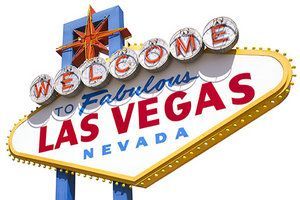One of the longest nerves in the body is known as the vagus nerve (VN). The VN is the 10th pair of cranial nerves that originates at the brain stem in the medulla oblongata. This nerve is part of the parasympathetic nervous system, which is a part of the ANS. Research suggests ear acupuncture can activate the VN.
Transforming Las Vegas
On a warm spring day in Las Vegas, Sonia Kim, clinic front desk staff, is busy preparing for a full day of intern shifts at Wongu Health Center. She greets patients, makes sure documents are properly signed, and lets the interns know that their patients have arrived. That scene is not unusual for an Oriental medicine school clinic. But it is unusual in Nevada, a state with less than sixty actively licensed practitioners, and only one Oriental medicine institution, Wongu University of Oriental Medicine. Although Nevada is the first state to have licensed an acupuncture practitioner in 1973, there has not been an Oriental medicine community clinic until recently.
The Wongu Health Center (WHC) is the community and teaching clinic for Wongu University of Oriental Medicine. Through regular monthly community outreach activities, the WHC has been educating the public about Oriental medicine, preventive healthcare, and cost-effective treatment options since its opening in 2014. In addition, WHC has endeavored to educate the general public about alternative medicine through a larger scale media campaign involving radio, online, and print media.

During its first week of operation, WHC had only a few patients with a single shift for one supervisor and four clinic students. Within several months, however, the number of patients increased to 50 and then to more than 150. The clinic has grown slowly, mainly because of the newness of Wongu University itself, a limited number of clinic students, and a general lack of public awareness of acupuncture and Oriental medicine modalities.
Because the Las Vegas Valley is a prime location for retirement, the majority of patients at WHC during its first year of operation were retirees, mostly females aged 65 and above who were seeking alternative ways to address their health concerns. Since the majority of the initial patients were elderly, they typically suffered from chronic diseases, such as hypertension, diabetes, and associated side effects from their prescribed medications, such as constipation. As news about WHC and Oriental medicine spread, patient demographics have been changing. Currently, while the majority of the patients are still females, retired senior patients comprise a fourth of the patient base.
Patients at WHC generally present with issues of pain, stress, fatigue, hypertension, diabetes, and cancer. Many come to the clinic because they would like to try something other than Western medicine. Once they are treated regularly at WHC, they experience improved conditions. For example, one patient with high blood pressure showed significant improvement within five treatments. Another, a retired senior male who could not walk straight, was immediately able to improve his balance and walk better after receiving only one Battle Field Acupuncture (BFA) protocol.
It has been very educational for interns to observe these marked improvements in patients at the clinic. Choonkook Han, a senior student and intern, who has been with Wongu University from the inception of the college, said, "before I began in the clinic, I was interested in Oriental medicine, but when I began seeing real patients as an intern, I could really understand and appreciate Oriental medicine. It has been rewarding for me to see how effective Oriental medicine treatments are as an intern in the clinic."
The patients at WHC are grateful for the efforts of the interns and OMDs (Oriental Medicine Doctors, the designated licensure title for Nevada). Most patients come to the clinic for information to improve their quality of life and to try an alternative mode of healthcare. They feel that the treatments are affordable and that their quality of life has improved. Moreover, they appreciate the opportunity the clinic provides for a quiet moment under the care of the interns and OMDs.
SN, a retired senior who has been coming to the clinic since 2015, said, "conventional medicines were not working so I decided to take a more holistic approach and I am so glad I did. It's amazing how much improvement the treatments have made in just eight weeks (eight sessions)." A similar response is that of retired senior PW, who has been coming to WHC for more than a year: "The WHC has been a wonderful experience for me. I started to have acupuncture about 35 years ago. I deal with many challenges and the quality of care and professionalism has been the best I have had anywhere in the Las Vegas valley. Wongu also has interesting educational events offered to the public. I go to every one I can. My husband now goes to Wongu and many of my friends take advantage of the facility."
Community Ear Acupuncture Clinic
Beginning in April of 2015, WHC also began to offer ear acupuncture treatments to the local community. These treatments are available monthly at a low cost with the intention of addressing the needs of persons who are financially disadvantaged, typically uninsured blue collar workers. During these three-hour sessions, patients are led to a converted intern lounge and seated in eight zero gravity chairs where OMDs hold a thirty-minute session for each patient utilizing NADA protocols coupled with distal points. When appropriate, the BFA protocols are also used.
Holly Sutton, a Wongu student who assists in the WHC, said "from the moment I became involved with Wongu Health Center, I knew the impact it would have on the local community. Working in the clinic, I see an inspirational story every day. Some swear by acupuncture, and others new to Oriental medicine are amazed by its results, being able to gain the ability to grasp with their hands, regaining taste, sleeping better, experiencing less pain, and so forth. They are amazed!" In 2016, the staff at WHC staff is working on re-conceptualizing the monthly clinic to address the needs of the veterans in the Las Vegas Valley.
Opportunities and Challenges
Although healthcare options are expanding in Las Vegas, Oriental medicine is still very new to the community. Accordingly, WHC's outreach activities have been focused on increasing public awareness of this form of care. Gradually, the underserved public in the Las Vegas, Henderson, and Southern Nevada area is beginning to realize the value of Oriental medicine and acupuncture. Many interested parties, including the media, are contacting Wongu University concerning its community acupuncture initiatives. There are, however, challenges in meeting patient demand for these services.
In its effort to support the underserved community, WHC's main challenge is the newness of the program and the shortage of practitioners and interns for the clinic. On average, WHC has been operating only four-days-a-week because of this shortage. Yeaji Suh, Wongu's Chief Academic Officer, believes, "the need for education and community health care service in Nevada is so dire, and yet so few OMDs are available to provide their services to help meet the needs of the community. Wongu's mission is to provide health care and service to the public as well as to train future generations of successful leaders and practitioners who will advocate for OM in Nevada and beyond. At heart, we should be willing to sacrifice our time and energy to serve the public and advance our field."
While the situation in Nevada for Oriental medicine is improving, Nevada has a long way to go until it will be fully able to support the public. Our challenges, however, are our opportunities.



